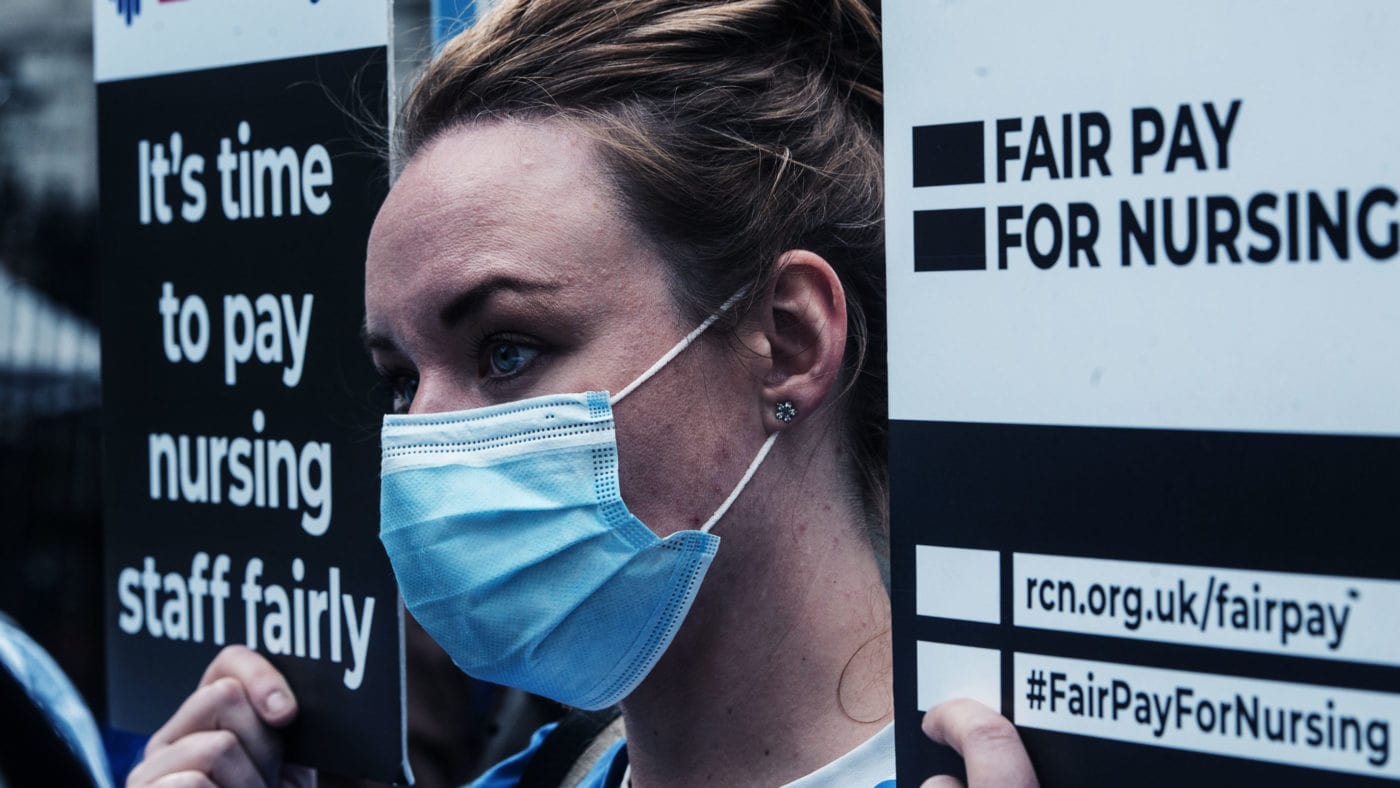It looks as though the Royal College of Nursing (RCN) is about to break with its 106-year-old practice and call a strike of its 300,000 members. The ballot seems to be running strongly in favour of action, with the Government’s recent pay award, averaging around 4.8%, seen as far too little. Pat Cullen, the RCN general secretary, wants an increase of inflation plus 5%, which could mean something of the order of 17%. It is difficult to see that the Government could contemplate anything on that scale.
The RCN insists that disruption to patients will be minimised, with emergency services being protected. The impact will depend on how long the strike action continues, but this inevitably means that waiting lists for non-urgent treatment, already running at more than 7 million, will lengthen. This is despite the strange claim by Cabinet minister Oliver Dowden that our hitherto accident-prone government has ‘well-oiled contingencies in place’ to deal with a strike.
It is difficult to demonise the Royal College. There are no Mick Lynch-style activists calling for a general election and the downfall of capitalism. But are nurses a special case, where our gratitude for their service during Covid, and indeed more generally, should override considerations of financial stringency?
It does appear to be true, as the RCN claims, that nurses’ pay has fallen in relative terms in recent years. However nursing is not that badly paid. It is now a graduate-entry profession, and the average pay of nurses one year after graduation is only bettered by a handful of degree holders – engineers, doctors, dentists, economists and vets. There is a clear system of career progression which can lead to senior nurses earning well in excess of £60,000. They have pensions which, while certainly not spectacular, are much better than those in comparably paid jobs in the private sector.
And of course they are unlikely ever to be unemployed. Remember that many workers lost their jobs during lockdown, while many more suffered a loss of pay under the furlough scheme. Nurses kept their jobs, and did not suffer a pay cut. Indeed, in company with other NHS workers, they received a 3% rise last year when other public sector pay was frozen.
The RCN points out that for many nurses the Covid pandemic was traumatic, and that the stress of the job, plus continuing staff shortages, has led to ‘burnout’, PTSD and increased numbers leaving the profession. However it is not clear what extra pay would do to relieve these problems. Indeed, if a very generous pay settlement meant less money for recruitment, the pressures on nurses might well increase.
It’s not easy to balance these arguments. For many years governments have largely passed the responsibility for determining large areas of public sector pay to Pay Review Bodies. The earliest NHS pay body began its work in 1960; today the NHS Pay Review Body recommends pay for 1.4 million ‘Agenda for Change’ (AfC) employees in England, Wales and Northern Ireland. Scotland does its own thing and, no doubt fortified by Barnett money and a wish to épater les Sassenachs, has given its nurses a bigger pay increase than in the rest of the UK.
The NHS pay review team certainly does a lot of work. Their latest report takes evidence from dozens of stakeholders and provides a wealth of information in its 170 pages. It does its level best to weigh up the views of all involved and reach a plausible conclusion.
Yet in many ways it is an absurd task. The AfC grouping covers hundreds of different jobs in the NHS. Even in nursing there are many different types of nurse which have to be shoehorned into bands with different skills and qualifications. Nurses may be in small or large settings, may work in the community, may be organised and managed in many different ways. It’s as if a pay body had to decide an appropriate average rate of pay increase for everybody who lives in Birmingham.
Pay Reviews never satisfy anybody. For one thing they are often delivered late and their recommendations, if accepted, have to be backdated and can’t be fully discussed before implementation. This year’s Review was published in July even though the pay period covered started in April. And, despite efforts to be even-handed, the Review can never get anywhere near what unions want as they have to be roughly compatible with government policy, which cannot avoid being determined by macroeconomic conditions.
Serious reform of pay-setting would involve fundamental restructuring of the NHS, decentralisation and greater use of the private sector, and the introduction of real competition into the healthcare labour market. At the moment, and indeed ever since the inception of the NHS, we have what in effect is a giant monopsony. Nurses’ pay, like that of other public sector workers, is not determined by supply and demand in a competitive market. That is the reason why UK nurses are paid considerably less than their counterparts in the United States.
And that is the reality that the RCN faces as it embarks on its first ever strike action. Unless there is fundamental reform, it probably won’t be their last, unfortunately. Perhaps the proposed action will force some increase in pay out of the Government, but given the policy direction Jeremy Hunt and Rishi Sunak have set out, it surely won’t be very much.
Click here to subscribe to our daily briefing – the best pieces from CapX and across the web.
CapX depends on the generosity of its readers. If you value what we do, please consider making a donation.


